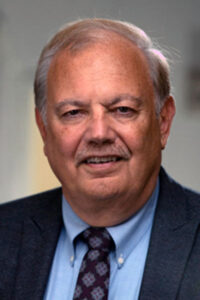Plenary to take closer look at the evolution of cancer biology and therapies
//
Estimated Read Time:

The Tuesday Plenary at the American Association for Cancer Research Annual Meeting 2021 brings together four scientists helping to take cancer therapy in new, exciting directions.
Cancer Biology and the Changing Therapeutic Landscape takes place from 10:45 a.m. – 12:45 p.m. EDT on Tuesday, April 13. Registered attendees can watch a recording of the session through June 21, 2021.
Olufunmilayo I. Olopade, MD, FAACR, University of Chicago Medicine Comprehensive Cancer Center, will explain during “Inherited susceptibility to cancer: From family reunions to the frontline of precision healthcare” how the combination of genomics, artificial intelligence, and deep learning allows for larger worldwide studies finding links for inherited risks and cancer. Olopade’s research involves tracing the root causes of triple-negative breast cancer through study of breast cancer cases in the very young across the African diaspora to understand the genes that may be contributing to inherited breast cancer risk. Study locations include Nigeria, Camaroon, Uganda, Latin America, Brazil, and the United States.

Integrating genomic testing into diagnostic tools can improve health equity by identifying those who are most likely to get cancer at a younger age, aid in prevention for those predisposed to epigenetic cancer variants, and ensure each patient receives the right treatment at the right time, Olopade said.
“We can accelerate how we understand precision health care, where once we were only thinking about the person who has developed cancer, we can now think about the person before they develop cancer and use tools like telehealth, especially after the pandemic, to do comprehensive risk assessment and genomic testing,” Olopade said. “We can now identify the germline variants that can point us toward targeted screening, targeted interventions, and targeted preventions.”
“Targeting secreted factors in the tumor microenvironment for pancreatic cancer therapy” will feature Tony Hunter, PhD, FAACR, Salk Institute, reviewing his lab’s work on pancreatic cancer, studying the interactions between tumor and stromal cells that’s leading to the creation of new drugs that target interactions mediated by secreted proteins and other factors. For the past decade, Hunter has focused on the fibroblast-like cells that surround tumor cells with a dense matrix of extracellular proteins such as collagen. These stellate cells also secrete proteins that can act as cytokine growth factors.

“People tend to focus on the tumor cells because they undergo the genetic changes, but they’re supported by and interact with these normal cells,” Hunter said. “The tumor cells are instructing the normal cells what to do, and the normal cells are helping the tumor cells. In some cases, particularly with pancreatic cancer, they’re creating an environment that suppresses the immune response. That’s why pancreatic cancer doesn’t respond checkpoint therapies, to date.”
Hunter’s lab found leukemia inhibitory factor (LIF), a cytokine related to IL-6, made by the stromal cells, promotes chemotherapy resistance in tumor cells, and, in work published in 2019, has shown that a LIF-blocking antibody and gemcitabine increased survival in a mouse pancreatic cancer model. High LIF is also found in human pancreatic cancer tissue, and a phase 1 clinical trial has been completed with a LIF-blocking antibody developed by Northern Biologics.
Dennis J. Slamon, FAACR, Revlon/UCLA Women’s Cancer Research Program at the Johnson Comprehensive Cancer Center, will present “Exploiting cancer biology in developing new treatment paradigms: Examples of past, present and future directions in breast cancer.” Now seen not as a single disease, but as a subtype of molecular diseases, Slamon said, breast cancer has moved beyond the one-size-fits all approaches that previously led to variable outcomes.

Slamon will review how the work he, his colleagues and others did led to a new type of targeted treatment using Herceptin for the overexpressed HER2 protein. He also will discuss new pathways that play roles in other subtypes of breast cancer, including CDK4/6 inhibitors, which have dramatically altered outcomes for patients with hormone receptor-positive breast cancers, which accounts for about 65 percent of breast cancer globally. He will conclude with a look at new techniques and technologies that provide increased accuracy in delivering cytotoxic agents to cancer cells while sparing normal cells and new combination therapies as understanding increases about the pathways playing roles in breast cancer pathogenesis.
“We’re looking for changes that aren’t the incremental changes that we used to see with chemotherapy or hormonal therapy regimens,” Slamon said. “We can make large changes and improvements in clinical outcomes, and that’s important as we integrate our understanding of cancer biology into cancer treatment. What we’re looking for is a dramatic improvement in both efficacy and safety, and that’s becoming a reality.”
William George Kaelin Jr., MD, FAACR, Dana-Farber Cancer Institute, will present “(Re)emerging principles of cancer therapy.” Kaelin received the 2019 Nobel Prize in Physiology or Medicine. His laboratory studies the functions of tumor suppressor proteins, using a variety of approaches to understand how these proteins prevent tumor growth.


